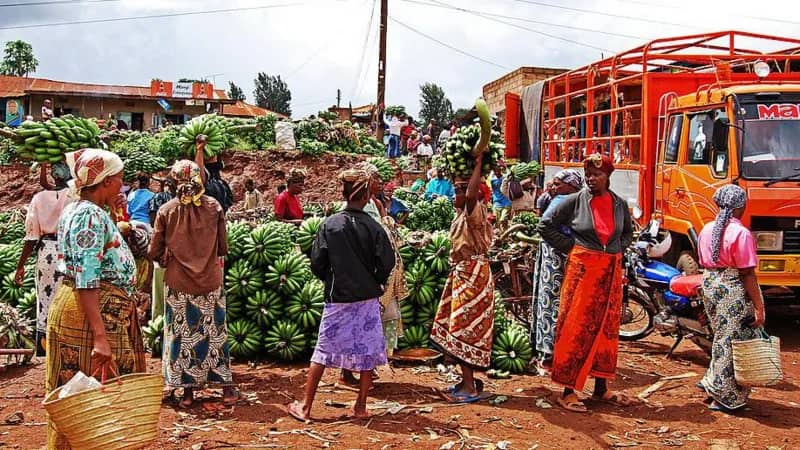By Burnett Munthali
A quiet unease has settled over the usually vibrant border crossing between Tanzania and Malawi, as the fallout from a simmering trade dispute begins to take tangible form.
From the stroke of midnight, Tanzanian authorities enforced a total ban on the entry of all agricultural imports from Malawi and South Africa.
This sudden and sweeping measure is a direct retaliation against what Tanzania describes as unfair restrictions on its own exports to those two countries.
At the heart of the dispute lies a pattern of long-standing grievances, particularly with South Africa’s persistent ban on Tanzanian bananas.
Malawi, too, recently raised the stakes by blocking the importation of a range of agricultural goods from Tanzania, including flour, rice, ginger, bananas, and maize.
Tanzania’s Minister of Agriculture, Hussein Bashe, confirmed the decision in a press briefing on Wednesday, emphasizing that the move was in defense of Tanzanian business interests.
“We are taking this step to protect our business interests,” Bashe said, adding pointedly, “In business, we must all respect each other.”
Despite diplomatic overtures and attempts at negotiation, efforts to resolve the dispute have so far fallen flat.
Nonetheless, Bashe noted that renewed talks were underway, raising the possibility of a diplomatic breakthrough.
The standoff comes at a particularly awkward time for the continent, which is striving for deeper economic integration through the African Continental Free Trade Area (AfCFTA), launched four years ago.
This trade row highlights the contradictions facing regional integration efforts, even as Africa’s leaders promote free trade as a panacea for development.
In the meantime, South African fruit exports such as grapes and apples, which typically reach Tanzanian markets, are now facing an abrupt halt.
Landlocked Malawi stands to lose even more, as it has long depended on Tanzania’s ports—especially Dar es Salaam—to export tobacco, sugar, and soybeans.
With Tanzania shutting its doors, Malawi may be forced to reroute these exports through Mozambican ports, a logistical shift that could raise transportation costs significantly.
The trade row also threatens the seamless flow of essential imports into Malawi, such as fuel, spare parts, and machinery, which also come through Tanzania.
The initial spark from Malawi’s side was a temporary import restriction issued in March, which authorities in Lilongwe described as a protective measure for domestic producers.
Trade Minister Vitumbiko Mumba explained at the time that the decision was a “strategic move” aimed at giving local farmers and manufacturers breathing space.
“It is a strategic move to create an environment where local businesses can thrive without the immediate pressure of foreign competition,” he said.
Tanzania, however, views the move as deeply damaging and disproportionately harmful to its traders.
Bashe was unreserved in his criticism, describing the restrictions as “unfair and harmful” and asserting that Malawi’s actions had “directly affected” Tanzanian economic interests.
While announcing the import ban, Bashe was keen to reassure the Tanzanian public that the move would not impact national food security.
“No Tanzanian will die from a lack of South African grapes or apples,” he quipped, suggesting the ban was not a matter of survival but of sovereignty and fairness.
He reiterated that the government’s motive was not to ignite a trade war but to ensure equitable treatment in the regional marketplace.
“Tanzania will not continue to allow unequal market access to persist at the expense of its people,” Bashe declared.
So far, both South Africa and Malawi have remained silent in the face of Tanzania’s retaliatory measures, declining to issue official responses.
At the Kasumulu border post, a major artery of Tanzania-Malawi trade, activity has dwindled dramatically since the ban took effect.
On Thursday morning, only a few fuel trucks were seen crossing from Tanzania into Malawi, a stark contrast to the usual convoy of agricultural goods-laden lorries.
Normally, more than 15 trucks ferrying bananas, tomatoes, and other farm produce would pass through the border daily, according to drivers who spoke to the BBC.
But on the Malawian side, a different picture emerged: empty trucks stood idle, their drivers uncertain about their next move.
One of them, businesswoman Happy Zulu, shared the growing frustration, saying drivers were “now trying to find alternative products to transport.”
“It’s been very difficult for them because they are used to carrying agricultural goods, and now they can’t carry not just bananas and tomatoes, but even maize and potatoes,” she said.
The pressure on traders has already begun to mount, with visible economic consequences on both sides of the border.
Last weekend, Bashe posted a video on social media showing bananas rotting in trucks that had been held up at the border due to Malawi’s import ban.
In another instance, tonnes of tomatoes were reported to have spoiled after Tanzanian trucks were denied entry into Malawi.
For Tanzania, Malawi has emerged as an increasingly important trade partner, with exports tripling between 2018 and 2023, according to official statistics.
While Tanzania may have options to redirect its goods to other regional markets like Kenya, Namibia, and South Sudan, Malawi’s options are narrower.
As a landlocked country, Malawi’s reliance on Tanzania’s infrastructure is both deep and difficult to replace overnight.
With Dar es Salaam off the table, Malawian exporters will likely be forced to consider Beira or Nacala in Mozambique—routes that could prove costlier and more time-consuming.
Though Minister Bashe insisted that the ban was a necessary stand, not a provocation, the implications are already reverberating throughout the Southern African Development Community (SADC).
All three countries involved—Tanzania, Malawi, and South Africa—are SADC members, a bloc designed to foster political and economic cooperation.
The current impasse underscores the fragility of such regional frameworks when national economic interests collide.
As the standoff continues, observers are calling for urgent diplomatic intervention to restore normalcy before long-term damage is done.
Without a swift and fair resolution, what began as a temporary trade measure could spiral into a protracted economic and political confrontation.
In the meantime, businesses, farmers, and transporters on all sides are left in limbo, anxiously watching for signs of progress or escalation.




